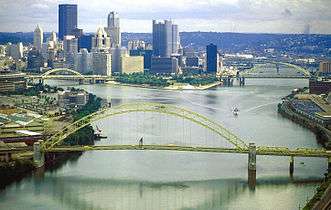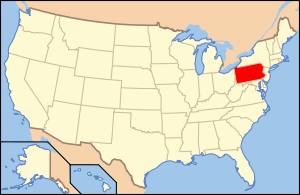West End Bridge (Pittsburgh)
| West End Bridge | |
|---|---|
 | |
| Coordinates | 40°26′47″N 80°01′37″W / 40.44631°N 80.02699°WCoordinates: 40°26′47″N 80°01′37″W / 40.44631°N 80.02699°W |
| Carries |
4 lanes of Two Pedestrian Walkways |
| Crosses | Ohio River |
| Locale | Pittsburgh, Pennsylvania |
| Official name | Allegheny County Bridge No 3 Ohio River |
| Other name(s) | West End-North Side Bridge |
| Maintained by | PennDOT |
| Characteristics | |
| Design | Bowstring arch bridge |
| Material | steel |
| Total length | 1,978.75 feet (603.12 m) |
| Width | 755.0 feet (230.1 m)[1] |
| Longest span | 780 feet (240 m) |
| Piers in water | 1 |
| Clearance below | 66 feet (20 m);73 feet (22 m) (When built)[2] |
| History | |
| Construction cost | $3,640,000[3] |
| Opened | December 2, 1932 |
| Designated | 1979 |
| Designated | 2001[4] |
 West End Bridge Location in Pittsburgh | |
The West End Bridge is a steel bowstring arch bridge over the Ohio River in Pittsburgh, Pennsylvania, approximately one mile below the confluence of the Allegheny and Monongahela Rivers. The bridge was built from 1930 to 1932 primarily by the American Bridge Company (superstructure) and the Foundation Company (substructure) and was the world's first to use tied-arch technology on a large scale.[5] It connects the West End to the Chateau neighborhood on the North Side of Pittsburgh. The bridge was placed on the National Register of Historic Places in 1979, and the List of Pittsburgh History and Landmarks Foundation Historic Landmarks in 2001. As of 2016, the bridge and its surrounding approaches are undergoing some major reconstruction.
The Riverlife Task Force conducted a competition in the spring of 2006 to design a pedestrian bridge across the Ohio attached to the West End Bridge. The goal of the competition was to create an iconic architectural element which ties both shore neighborhoods with the waterfronts while eliminating the need for pedestrians to cross traffic lanes and empty lots. The winning design was submitted by Endres Ware in association with OLIN, Ammann & Whitney, Auerbach Glasow, and RWDI; however, there is not yet a budget or timelime for actual construction of the winning design.
 Looking downstream
Looking downstream Looking upstream
Looking upstream
See also
-
 Bridges portal
Bridges portal -
 Pennsylvania portal
Pennsylvania portal -
 Pittsburgh portal
Pittsburgh portal - Bridges of Pittsburgh
- List of bridges documented by the Historic American Engineering Record in Pennsylvania
- List of crossings of the Ohio River
References
- ↑ Kidney, Walter C. (1999). Pittsburgh's Bridges Architecture and Engineering. Pittsburgh: Pittsburgh History & Landmarks Foundation. p. 58.
- ↑ Kidney, Walter C. (1999). Pittsburgh's Bridges Architecture and Engineering. Pittsburgh: Pittsburgh History & Landmarks Foundation. p. 160.
- ↑ "Bridges and Tunnels of Allegheny County and Pittsburgh, PA - HAER PA-96: West End-North Side Bridge, Pittsburgh, PA". pghbridges.com.
- ↑ Historic Landmark Plaques 1968-2009 (PDF). Pittsburgh, PA: Pittsburgh History & Landmarks Foundation. 2010. Retrieved 2010-07-02.
- ↑ "Bridges and Tunnels of Allegheny County and Pittsburgh, PA - Golden Age in the City of Bridges". pghbridges.com.
External links
![]() Media related to West End Bridge at Wikimedia Commons
Media related to West End Bridge at Wikimedia Commons
- Historic American Engineering Record (HAER) No. PA-96, "West End-North Side Bridge, Spanning Ohio River, approximately 1 mile downstream from confluence of Monongahela & Allegheny rivers, Pittsburgh, Allegheny County, PA", 50 photos, 19 data pages, 5 photo caption pages
- pghbridges.com
- Pedestrian bridge design competition
- RWDI

